Common Japanese Verbs Hey Guys, Below Is A List Of What I Believe To Be Common Japanese Verbs! I’ll

Common Japanese Verbs Hey guys, below is a list of what I believe to be common Japanese verbs! I’ll also be posting a list of common adjectives, adverbs, and nouns in the future too, so keep an eye out for them! There are a number of ways that verbs have been categorised in Japanese, such as Ichidan 「一段」 and Godan 「五弾」, andうverbs and るverbs. I’ve listed them all in the titles for easier understanding, depending on what distinction you’re familiar with. These classifications come in handy when you need to conjugate verbs so try to remember what category they belong to! うverbs・五弾「ごだん」・Class 1: To begin (something starts on its own)・始まる・はじまる To buy・買う・かう To close・閉まる・しまる To die・死ぬ・しぬ To drink・飲む・のむ To eat・食べる・たべる To end・終わる・おわる To enter・入る・はいる To give back (return something to someone)・返す・かえす To go・行く・いく To go back・戻る・もどる To have/exist (inanimate objects)・ある To know・知る・しる To learn・習う・ならう To listen・聞く・きく To make・作る・つくる To meet・会う・あう To play・遊ぶ・あそぶ To receive・貰う・もらう To repair・直す・なおす To return・帰る・かえる To ride on・乗る・のる To run・走る・はしる To send・送る・おくる To sit・座る・すわる To speak・話す・はなす To swim・泳ぐ・およぐ To take・取る・とる To take off (shoes, clothes)・脱ぐ・ぬぐ To understand・分かる・わかる To use・使う・つかう To wait・待つ・まつ To wake up・起こす・おこす To wash・洗う・あらう To write・書く・かく るverbs・一段「いちだん」・Class 2: To answer・答える・こたえる To bathe・浴びる・あびる To be able・出来る・できる To be born・生まれる・うまれる To be enough・足りる・たりる To begin (to start something)・始める・はじめる To borrow・借りる・かりる To break・壊れる・こわれる To check・調べる・しらべる To cut・切れる・きれる To exceed・過ぎる・すぎる To find・見つける・みつける To forget・忘れる・わすれる To get off・降りる・おりる To get tired・疲れる・つかれる To give・あげる To go out・出る・でる To greet・迎える・むかえる To have/exist (animate objects)・いる To help・助ける・たすける To make a mistake・間違える・まちがえる To open・開ける・あける To remember・覚える・おぼえる To see・見える・みえる To show・見せる・みせる To sleep・寝る・ねる To stop・止める・やめる To teach・教える・おしえる To think・考える・かんがえる To wear・着る・きる Irregular verbs・Class 3: To come・来る・くる To do・する
する verbs: する verbs are made by adding する to a noun. To ask questions・質問する・しつもんする To be surprised・びっくりする To call・電話する・でんわする To do the cleaning・掃除する・そうじする To do the washing・選択する・せんたくする To get married・結婚する・けっこんする To go shopping・買い物する・かいものする To have a meal・食事する・しょくじする To reserve・予約する・よやくする To study・勉強する・べんきょうする To take a walk・散歩する・さんぽする To travel・旅行する・りょこうする
More Posts from Earthquakedeer and Others
N5 verb list
会う (あう)- to meet
開く (あく)- to become open
開ける (あける)- to open
上げる (あげる)- to give
遊ぶ (あそぶ)- to play, to make a visit
あびる - to bathe, to shower
洗う (あらう)- to wash
ある - to be, to have (inanimate)
歩く (あるく)- to walk
言う (いう)- to say
行く (いく)- to go
居る (いる)- to be, to have (animate)
要る (いる)- to need
入れる (いれる)- to put in
歌う (うたう)- to sing
生まれる (うまれる)- to be born
売る (うる)- to sell
起きる (おきる)- to get up
置く (おく)- to put
教える (おしえる)- to teach, to tell
押す (おす)- to push, to stamp
覚える (おぼえる)- to remember
泳ぐ (およぐ)- to swim
降りる (おりる)- to get off, to descend
終わる (おわる)- to finish
買う (かう)- to buy
返す (かえす)- to return something
帰る (かえる)- to return, to go back
かかる - to take time or money
書く (かく)- to write
かける - to call by phone
貸す (かす)- to lend
借りる (かりる)- to borrow
消える (きえる)- to disappear
聞く (きく)- to hear, to listen, to ask
切る (きる)- to cut
着る (きる)- to put on
曇る (くもる)- to become cloudy/dim
来る (くる)- to come
消す (けす)- to erase, to turn off
答える (こたえる)- to answer
コピーする - to copy
困る (こまる)- to be worried
咲く (さく)- to bloom
差す (さす)- to stretch out, to raise
散歩する (さんぽする)- to stroll
死ね (しね)- to die
閉まる (しまる)- to close, to be closed
閉める (しめる)- to close something
締める (しめる)- to tie
知る (しる)- to know
吸う (すう)- to smoke
住む (すむ)- to live in
する - to do
座る (すわる)- to sit
掃除する (そうじする)- to clean, to sweep
出す (だす)- to put out
立つ (たつ)- to stand
頼む (たのむ)- to ask
食べる (たべる)- to eat
違う (ちがう)- to differ
使う (つかう)- to use
疲れる (つかれる)- to get tired
着く (つく)- to arrive at
作る (つくる)-to make
つける - to turn on
勤める (つとめる)- to work for someone
出かける (でかける)- to go out
できる - to be able to
出る (でる)- to leave, to go out
取る (とる)- to take something
撮る (とる)- to take a photo or film
鳴く (なく)- to chirp, roar, croak etc
無くす (なくす)- to lose something
習う (ならう)- to learn
並ぶ (ならぶ)- to line up, to stand in line
並べる (ならべる)- to line up, to set up
なる - to become
脱ぐ (ぬぐ)- to take off clothes
寝る (ねる)- to sleep, to go to bed
登る (のぼる)- to climb
飲む (のむ)- to drink
乗る (のる)- to ride, to get on
入る (はいる)- to enter, to contain
はく - to wear, to put on trousers
始まる (はじまる)- to begin
走る (はしる)- to run
働く (はたらく)- to work
話す (はなす)- to speak
貼る (はる)- to stick
晴れる (はれる)- to be sunny
引く (ひく)- to pull
弾く (ひく)- to play an instrument
吹く (ふく)- to blow (wind)
降る (ふる)- to fall (rain, snow)
勉強する (べんきょうする)- to study
曲がる (まがる)- to turn, to bend
待つ (まつ)- to wait
磨く (みがく)- to brush teeth, to polish
見せる (みせる)- to show
見る (みる)- to see, to watch, to look
持つ (もつ)- to hold
休む (やすむ)- to rest
やる - to do
行く (ゆく)- to go
呼ぶ (よぶ)- to call out, to invite
読む (よむ)- to read
練習する (れんしゅうする)- to practice
分かる (わかる)- to be understood
忘れる (わすれる)- to forget
渡す (わたす)- to hand over
渡る (わたる)- to go across
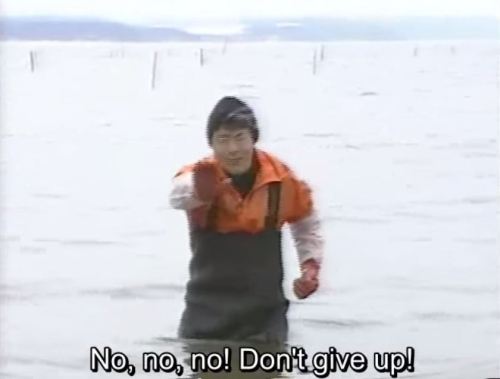
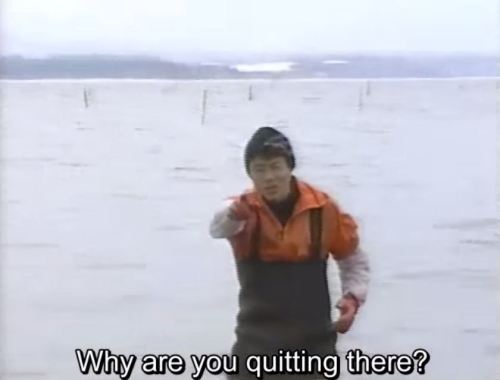
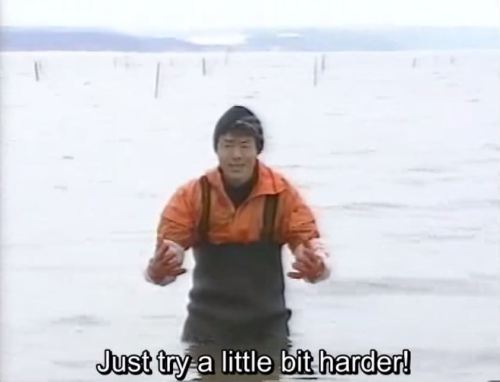

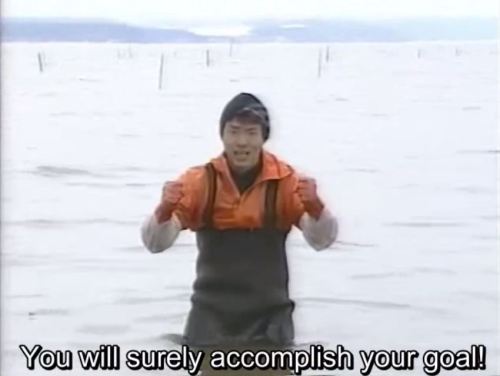
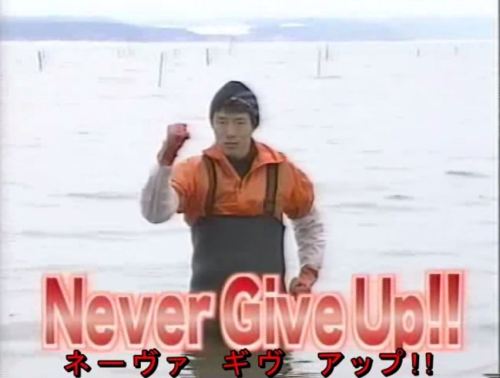

random word of the day
落ち葉 (おちば) • fallen leaves
German Verbs
A list of useful verbs because my knowledge of verbs in German is very limited
sein - to be haben - to have gehen - to go laufen - to walk rennen - to run fahren - to drive reisen - to travel schwimmen - to swim stehen - to stand sitzen - to sit machen - to make/do erschaffen - to create kochen - to cook essen - to eat trinken - to drink sprechen - to speak sagen - to say fragen - to ask hören - to hear zuhören - to listen mögen - to like wissen - to know (a concept) kennen - to know (a person) denken - to think glauben - to believe wollen - to want können - to be able to brauchen - to need lernen - to learn schreiben - to write lesen - to read lernen - to study verstehen - to understand vergessen - to forget erinnern - to remember üben - to practice sehen - to see beobachten - to watch tragen - to wear aufwachen - to wake up schlafen - to sleep arbeiten - to work kaufen - to buy spielen - to play benutzen - to use bringen - to bring kommen - to come zurückkommen - to return (come back) geben - to give bekommen - to receive nehmen - to take schauen - to look finden - to find treffen - to meet anfangen - to start beenden - to finish versuchen - to try entscheiden - to decide geboren werden - to be born sterben - to die leben - to live (a life) wohnen - to live (in an area) helfen - to help schicken - to send verändern - to change (alter)
[French]
If there are any mistakes or better translations please let me know!
Edit: I fixed a few mistakes
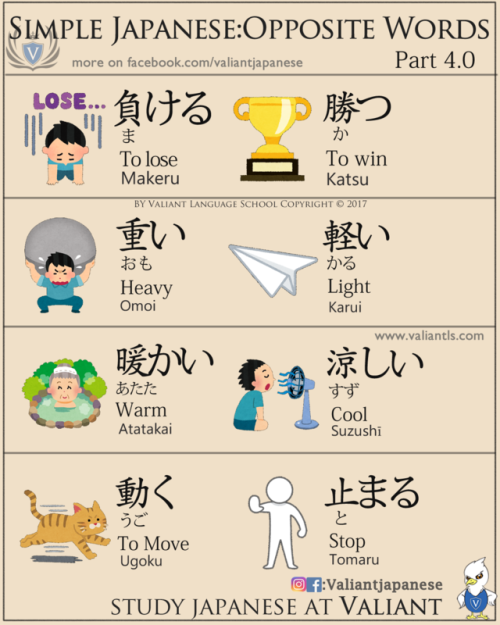
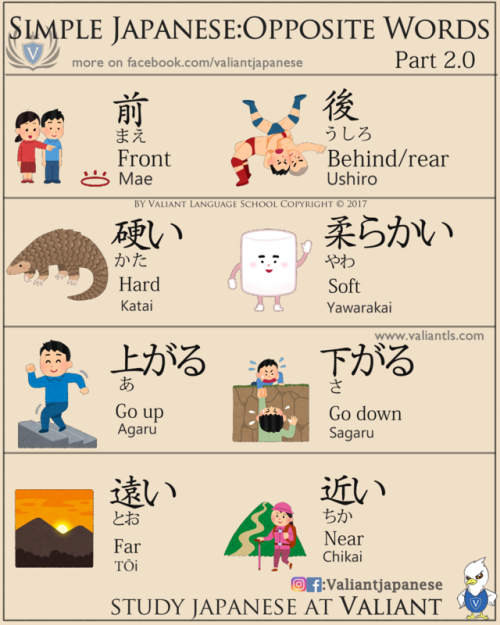
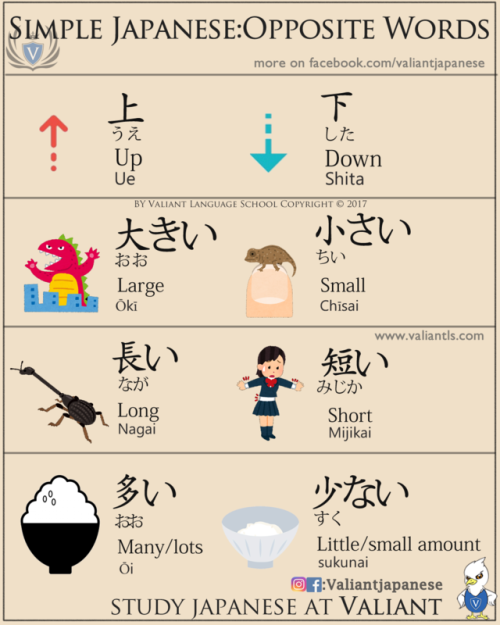
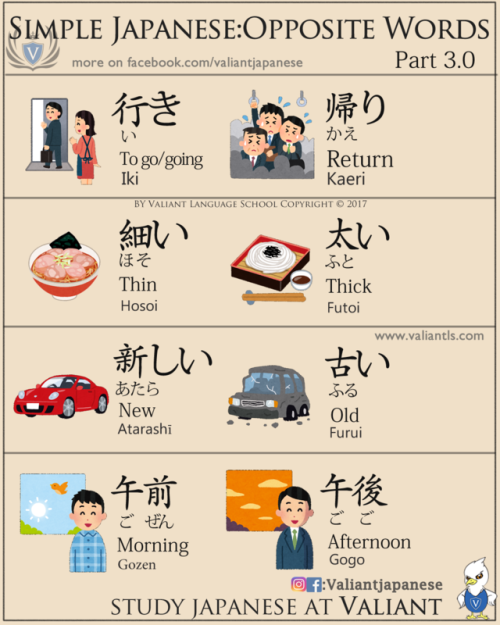
The Opposite Words in Japanese
Follow us on www.instagram.com/valiantjapanese
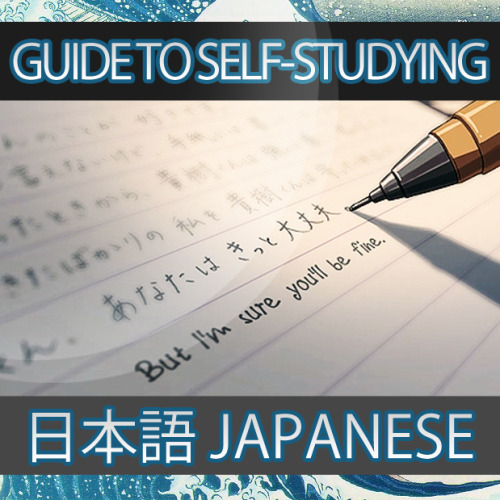
Guide to Self-Studying Japanese
A large proportion of Japanese learners self-study. Finding places to learn Japanese in a classroom environment can be difficult and expensive. Here’s a guide on how you can learn Japanese for free and from the comfort of your sofa.

When learning Japanese, the most important step is to learn Hiragana and Katakana, the writing alphabets of Japanese.
The best way I’ve found to do that is to make flashcards. Make sure you practice writing as well as recognizing them, this will not only be a great skill to have but will also reinforce the shapes in your mind.
Resources:
[Hiragana 42], the best guide I’ve found to learn the Hiragana (in a day!) [Hiranana and Katakana Quiz Site] [Kana Invaders Game] [Anki] An amazing program that will make sure you never forget any Kana….

The next step is to start learning vocabulary. Where can you find what to learn? Use a site like Memrise to find word lists (for example, there is a word list for all the vocabulary in starter textbooks like Genki), and use the amazing interface to learn them and keep them in your long term memory.
Resources:
[Memrise] as mentioned above to find and learn vocabulary lists. [Most Common Words List] [Anki] An amazing program that will make sure you never forget any Vocabulary….

While encountering vocabulary, you’re likely to be coming across super-complicated-looking Kanji. You can learn Kanji through Memrise as above, but there are some other websites that may be of interest.
Resources:
[Kanji Damage] A great site where you can learn Kanji through mnemonics. [WaniKani] by the same people who make TextFugu can help you learn Kanji from scratch. [Anki] An amazing program that will make sure you never forget any Kanji….

The next step is to apply that new vocabulary to grammar points and start making sentences.
If you can’t get your hands on textbooks like Genki, don’t fear! There are a lot of great online grammar resources.
Resources:
[TextFugu] a highly rated ‘online textbook’ which will guide you right from the beginning of learning Japanese. [Guide to Japanese] another online textbook with a lot of grammar points and excellent explanations.

So you probably started to learn Japanese because you have some interest in Japanese media. Time to start using it to your advantage!
Aside from the obvious watching Anime, J-dramas and films, why not try Reading Japanese News? Watching Japanese TV? Just make sure you are making these activities productive - note down new vocabulary, add them to Anki, and keep learning! It’s much easier to learn things you’re interested in.

The most important but difficult part of self-studying Japanese is getting your own compositions checked. Utilize all that grammar and vocabulary and write a short piece, it could be a diary entry or a short essay. Get it recorded for you by a native on RhinoSpike, and checked for grammar and consistencies on Lang-8.These sites also give you the chance to connect with Japanese natives, and perhaps start up some language exchanges!
For more resources, take a look at my Ultimate Resources List
Any more tips? Please submit them here!
_DSC0093 by Kevin Ho
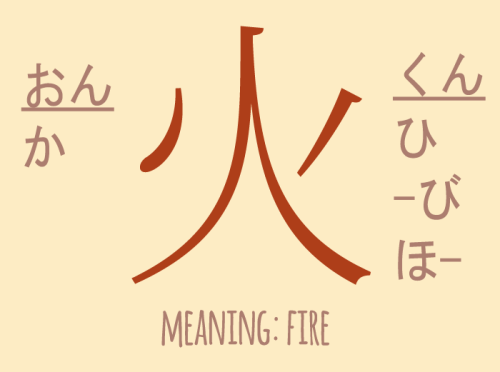
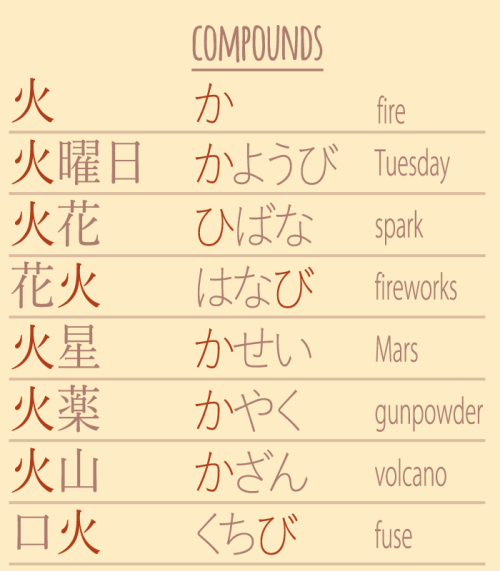
some compounds of one of my favourite kanji, 火

16.06.17 // 10.23 AM
learning japanese using tae kim’s guide! apparently my friend managed to get her japanese to N5 level just by a few years of watching anime and no formal lessons?? i think that’s amazing - i’ve been watching anime for a year (i used to just read manga) and so far i’ve only been able to pick up basic phrases…
[ check out my instagram @studyingg ♡ ]

thank you, wiktionary
-
 thegraphitearchives reblogged this · 3 weeks ago
thegraphitearchives reblogged this · 3 weeks ago -
 ore-wa-omae-da liked this · 9 months ago
ore-wa-omae-da liked this · 9 months ago -
 25blueberrymochi reblogged this · 10 months ago
25blueberrymochi reblogged this · 10 months ago -
 indigonightmare liked this · 1 year ago
indigonightmare liked this · 1 year ago -
 lifelonglang reblogged this · 1 year ago
lifelonglang reblogged this · 1 year ago -
 melanielearnslanguages reblogged this · 1 year ago
melanielearnslanguages reblogged this · 1 year ago -
 i-love-books-because-reasons liked this · 1 year ago
i-love-books-because-reasons liked this · 1 year ago -
 fromthe2016 reblogged this · 1 year ago
fromthe2016 reblogged this · 1 year ago -
 diafranindvansu liked this · 1 year ago
diafranindvansu liked this · 1 year ago -
 leacumsnetpcup liked this · 1 year ago
leacumsnetpcup liked this · 1 year ago -
 okutobaa reblogged this · 1 year ago
okutobaa reblogged this · 1 year ago -
 mainblogrentfree liked this · 2 years ago
mainblogrentfree liked this · 2 years ago -
 jafsisomni liked this · 2 years ago
jafsisomni liked this · 2 years ago -
 pokochxn liked this · 2 years ago
pokochxn liked this · 2 years ago -
 thelittlestprincessstudies reblogged this · 3 years ago
thelittlestprincessstudies reblogged this · 3 years ago -
 strawberry-studiess reblogged this · 3 years ago
strawberry-studiess reblogged this · 3 years ago -
 huskygeek420 reblogged this · 3 years ago
huskygeek420 reblogged this · 3 years ago -
 huskygeek420 liked this · 3 years ago
huskygeek420 liked this · 3 years ago
Just a person learning Japanese. Self-learner. If you're also studying Japanese and want to practice with someone (and you're also very much a beginner) then message me! はじめまして! さびーなです。よとしく!
196 posts